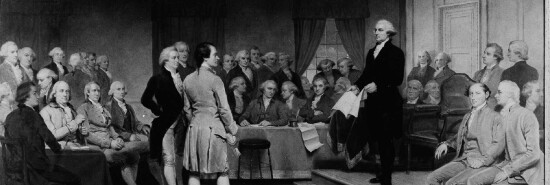
We owe thanksgiving for our form of government
Washington Examiner
Video Embed
Thanksgiving is not a day just for feasting and perhaps for random expressions of thanks. It’s a day for thanks specifically to God and thanks specifically for national blessings.
In his first Thanksgiving Proclamation in 1789, George Washington made clear one of the primary blessings for which thanks to God was due. The first paragraph emphasizes it: “Especially by affording [to the people of the United States] an opportunity peaceably to establish a form of government for their safety and happiness.”
WHY THE COST OF THE HOLIDAY DINNER HAS RISEN SO MUCH IN RECENT YEARS
Several sentences later, he elaborated: “for the peaceable and rational manner, in which we have been enabled to establish constitutions of government … [and] for the civil and religious liberty with which we are blessed.”
In that latter clause, he was echoing the famous Plymouth Colony’s 1623 declaration of Thanksgiving, in which William Bradford penned thanks for the “freedom to worship God according to the dictates of our own conscience.”
Specifically, then, we are to be grateful for the rational system of constitutional, republican government bequeathed to us and for the liberties, especially religious liberty, which this government protects.
These days there’s a widespread belief, especially among younger adults, that America’s governmental system is a failure or, worse, that the American experiment itself is ignoble. This belief, however, is the voice of ignorance, married to a deficit of moral reasoning.
Although the government has been weighted down with too many counterproductive accessories, the constitutional system remains what British statesman William Gladstone acknowledged to be “the most wonderful work ever struck off at a given time by the brain and purpose of man.” The nation it serves, firmly rooted in the liberty of conscience from which all other liberties flow, has been among the greatest forces for good the world has ever known.
Too few people of any age, but especially younger ones, understand and appreciate how the Constitution works well — and works for what is good. We need renewed esteem and gratitude for the Constitution’s moral and practical genius.
In the U.S. system, every law-abiding citizen absolutely has equal right and equal opportunity to participate in the political process. Everyone has right and opportunity to speak in the public square, completely unfettered as long as he or she does not violate the same rights of others. Everyone has the right to form associations of like-minded people for private or public purposes. Everyone can freely practice faith, not just in formal worship but also in following the callings of their faith in charitable endeavors.
Nobody can be convicted of a crime without the government running a large gamut of procedural hurdles designed to protect the innocent, including, of course, the guarantee that guilt can be determined only by a jury of fellow citizens. And so on through a host of other liberties and protections from government abuse.
Nowhere else on Earth is such a plethora of rights and protections, especially those of free expression, explicitly enshrined in a nation’s very charter of existence and duly honored in practice. These rights have been there since the founding era, by far-sighted humanitarians who today are vilified by leftist academicians devoid of context or moral sense. When established more than two centuries ago, those rights and that ability to participate directly in governance were even more distinctive than they are now, far surpassing those allowed in what was then the next greatest paragon of civic rights, Great Britain.
Those who live in the U.S. today should understand what a tremendous advance for human flourishing and human dignity the American founding was, and we should appreciate how the Constitution serves us still.
It serves us by significantly separating and partially sharing powers among distinct branches and among three different levels, national, state, and local, of government. It does so by combining a general reliance on majority rule with specific guarantees of rights, even for those in numerical minorities.
And to the extent that several dozen nations now approximate, but do not equal, these procedural and formal guarantors of liberty, they do so by having used the U.S. as a model.
CLICK HERE TO READ MORE FROM THE WASHINGTON EXAMINER
That model, by the standards of history, is little short of a miracle. It is what keeps the U.S. from suffering the totalitarianism of North Korea, the repression and genocide practiced by China, the brutality of Russia, the extreme depredations of rights of women and others in strict Muslim nations, or the poverty and instability of far more than half the nations of the world.
As we “say grace” in whatever form we want, around abundant dinner tables in our relative prosperity and safety, free to voice opinions and gripe about leaders we ourselves elected, let us be thankful for the ingenious form of government that, with God’s own grace, sets the civic conditions that make those blessings possible.
